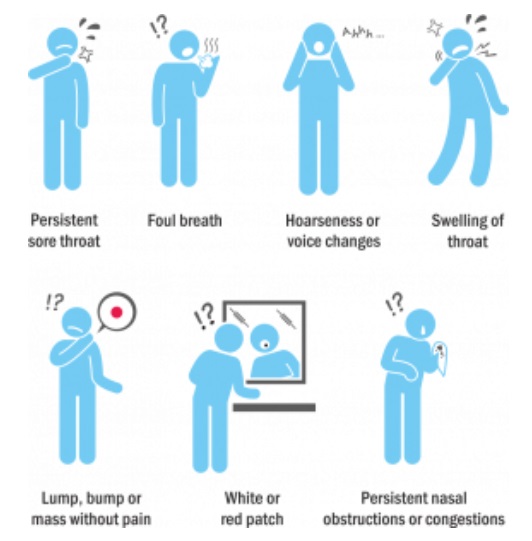What Are Head and Neck Cancers?
- Head and neck cancers are diagnosed in regions such as in the sinuses, nose, mouth, throat, tongue, or other regions of the head and neck.
- Head and neck cancers are twice as common in men.
- More commonly diagnosed after the age of 50.
What are the symptoms of head and neck cancers?
Common symptoms among Head and Neck Cancers are:
-
Difficulty in swallowing, and a change or hoarseness in the voice
-
Persistent lumps or sores
-
Persistent sore throat
-
Swelling or lumps in the neck or throat
In the mouth, oral cancer can cause—
-
White or red spots or sore(s) that do not heal on the gums, tongue, or lining of the mouth.
-
Swelling in the jaw.
-
Pain or bleeding in the mouth.
At the back of the mouth (pharynx), cancer can cause—
-
Difficulty breathing or speaking
-
Difficulty eating or swallowing
-
A feeling of something stuck in your throat
-
Pain or ringing in the ears or trouble hearing.
In the voice box (larynx), cancer can cause—
-
Pain when swallowing.
-
Ear pain.
In the sinuses and nasal cavity, cancer can cause—
-
Blocked sinuses that do not clear
-
Nosebleeds
-
Sinus infections that do not respond to antibiotics
-
Headaches.
-
Eye pain or swelling
-
Pain in the upper teeth
In the salivary glands, cancer can cause—
-
Swelling under the chin
-
Numbness or paralysis in face



What are the Causes and Risk Factors for Head and Neck Cancers?
The most common causes and risk factors include:
-
Smoking and Tobacco
-
Alcohol
-
Human papillomavirus (HPV) infections
-
Epstein-Barr virus infection
-
Occupational exposure
-
Preserved or salted foods
-
Oral hygiene
-
Genetic and hereditary factors
Treatment For Head and Neck Cancers
- Surgery
- Radiation therapy
- Chemotherapy
- Targeted Drug Therapy
At HEMATOLOGY & ONCOLOGY CARE we customize your care so you can receive the most advanced, least invasive treatment with the fewest side effects. Planning of the treatment involves an interdisciplinary team of medical professionals. This usually implies a meeting of different specialists we have at HOC.


